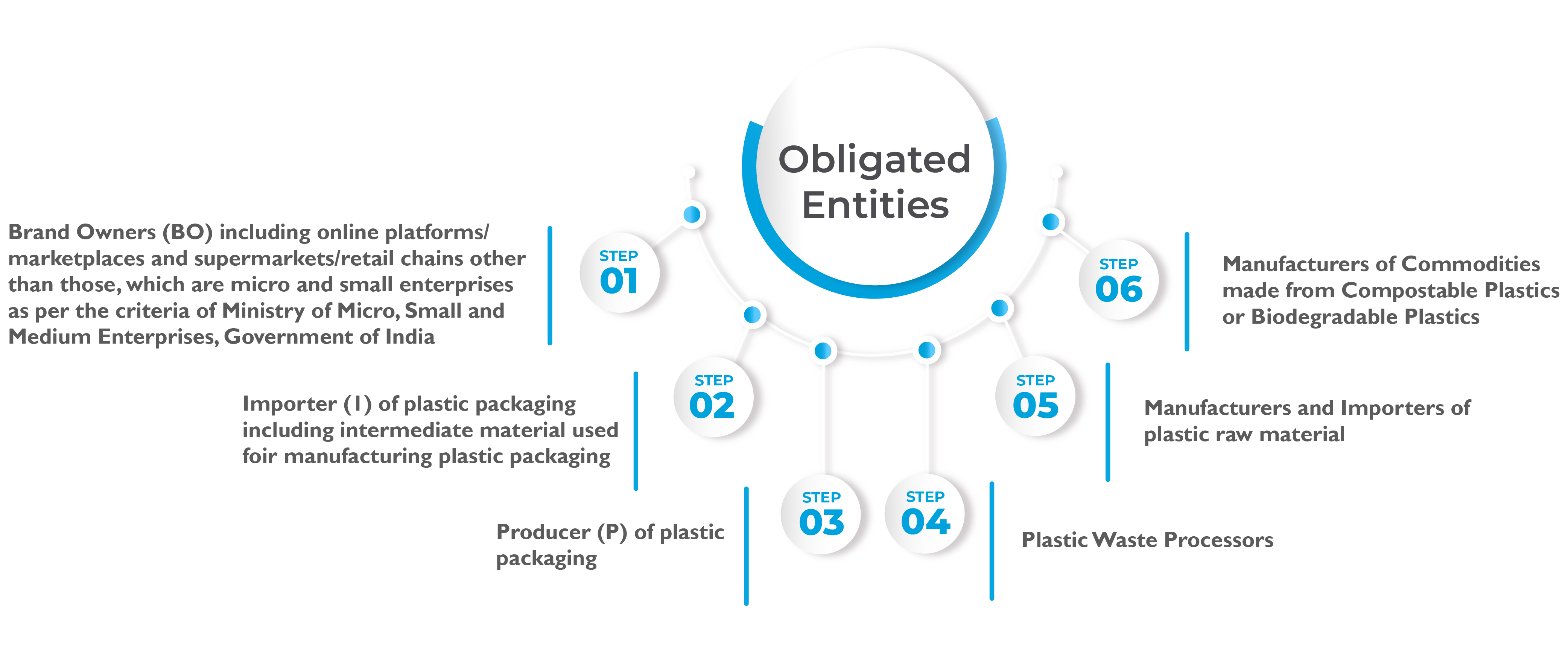Extended Producer Responsibility (hereafter referred to as “EPR”) denotes responsibility for the environmentally sound management of the product till its end of life.
The Plastic Waste Management Rules (hence referred to as “Rules”), 2016 cast EPR on Producer, Importer, Brand Owner, Manufacturer and Manufacturers of Commodities made from Compostable Plastics or Biodegradable Plastics. EPR-related compliances apply to both pre and post-consumer plastic waste.
Key Definitions:
- Brand Owner means a person or company who sells any commodity under a registered brand label or trademark.
- Importer means a person who imports for commercial use, any plastic packaging or any commodity with plastic packaging or carry bags or plastic sheets or like material, or plastic raw material including in the form of resin or pellets, or intermediate material to be used for manufacturing plastic packaging such as films or preforms.
- Manufacturer means and includes a person engaged in production of plastic raw material, including compostable plastics and biodegradable plastics.
- Plastic Waste Processors means recyclers of plastic waste as well as entities engaged in using plastic waste for energy (waste to energy) including in coprocessing or converting plastic waste to oil (waste to oil) except in cases where feedstock chemicals are produced for further use in the production of plastic which may then be considered under recycling, industrial composting.
- Producer means a person engaged in manufacturing of plastic packaging; and, includes a person engaged in manufacture of intermediate material to be used for manufacturing plastic packaging, and also the person engaged in contract manufacturing of products using plastic packaging or through other similar arrangements for a brand owner.
- Recyclers are entities who are engaged in the process of recycling of plastic waste.
- Waste Generator means and includes every person or group of persons or institution, residential and commercial establishments including Indian Railways, Airport, Port and Harbour and Defense establishments which generate plastic waste.
- Multilayered Packaging means any material used or to be used for packaging and having at least one layer of plastic as the main ingredients in combination with one or more layers of materials such as paper, paper board, polymeric materials, or aluminium foil, either in the form of a laminate or co-extruded structure.
- Compostable Plastics mean plastic that undergoes degradation by biological processes during composting to yield CO2, water, inorganic compounds and biomass at a rate consistent with other known compostable materials, excluding conventional petro-based plastics, and does not leave visible, distinguishable or toxic residue.
- Biodegradable plastics means plastics, other than compostable plastics, which undergoes degradation by biological processes in specific environment such as soil, landfill, sewage sludge, fresh water, marine, without leaving any micro plastics or visible or distinguishable or toxic residue, which has adverse environment impact.

Registration
Registration of Producers, Importers, Brand-Owners, Plastic Waste processors, Manufacturers, and Manufacturers of Commodities made from Compostable Plastics or Biodegradable Plastics shall be done by State Pollution Control Board or Pollution Control Committee through the centralized Extended Producer Responsibility portal developed by Central Pollution Control Board. Registration in case of more than two states shall be done by Central Pollution Control Board, through centralized portal (https://eprplastic.cpcb.gov.in/#/plastic/home). The registration granted under this rule shall be valid for a period of one year, unless revoked, suspended or cancelled and shall subsequently be granted for three years.
In case an entity falls in more than one sub-categories (Producer, Importer, Brand owner, Plastic Waste Processor engaged in recycling, waste to energy, waste to oil, and industrial composting, Manufacturers, and Manufacturers of Commodities made from Compostable Plastics or Biodegradable Plastics) then such entity shall register under each of those sub-categories separately.
Further, in cases, where the entity has units in different states, in a particular sub-category (Producer, Importer, Brand owner, Plastic Waste Processor engaged in recycling, waste to energy, waste to oil, and industrial composting, Manufacturers, and Manufacturers of Commodities made from Compostable Plastics or Biodegradable Plastics), suchunits shall also be registered separately.
However, only one registration under a sub category in a state would be needed even if more than one units are located in a state. The registration shall be as per Standard Operating Procedure laid down by Central Pollution Control Board for the purpose, as per the Guidelines.
While registering, the entities shall have to provide following documents in pdf/jpg/png file format:
- PAN, GST, CIN, IEC (for importer) of the Company
- Aadhar/ PAN of Authorized person
- DIC Registration (if unit registered with DIC)
- Process flow diagram (for producers only)
- Consent issued by SPCB/PCC (if unit has a production facility)
- Scanned copy of signatures of authorized persons
- Covering letter
- Document regarding any other information which the unit wishes to provide.
The EPR of producers, which are micro and small enterprises as defined under the Micro, Small and Medium Enterprises Development Act, 2006, shall be fulfilled by manufacturer or importer of plastic raw material who has supplied the plastic raw material to such micro and small producers, provided that the target for use of recycled plastic content shall be fulfilled by such producers.
Returns & Certificates
- Producer, Importer, Brand Owners, Plastic Waste Processor & Manufacturers, and Manufacturers of Commodities made from Compostable Plastics or Biodegradable Plastics shall file Annual Returnon the plastic packaging waste collected and processed towards fulfilling obligations under Extended Producer Responsibility with the Central Pollution Control Board or concerned State Pollution Control Board or Pollution Control Committee as per pro forma prescribed by Central Pollution Control Board by the 30th June of the next financial year.
- Certificates for the processing of plastic waste are only to be issued by certified waste processors, this is not the case when using plastic trash for road building. When using plastic garbage for road building, producers, importers, and brand owners are required to submit a self-declaration certificate in the form of a pro forma created by the Central Pollution Control Board. The certificate provided by only registered plastic waste processors shall be considered valid in order to fulfil the Extended Producer Responsibility.
- The Manufacturer of commodities made from compostable plastics or biodegradable plastics shall report the quantity of such commodities introduced in the market and pre-consumer waste generated to the Central Pollution Control Board.
- Manufacturer and Importer of plastic raw material shall prepare and submit online a quarterly report to the State Pollution Control Board or Pollution Control Committee concerned by the last day of month following the quarter.
- In cases where it is not possible to meet the obligation of recycling plastic content on account of the statutory requirement, the obligation can be met through purchase of certificate of equivalent quantity from such entities who have used recycled content in excess of their obligation.
- As per the amendment of 2024 in the rules, the CPCB is required to issue guidelines for authorization of agencies for establishment of electronic platform for trade of Extended Producer Responsibility certificates between obligated entities.
Prohibition & Penalty
- The entities (Producer, Importer, Brand owner, Plastic Waste Processor engaged in recycling, waste to energy, waste to oil, and industrial composting, Manufacturers, and Manufacturers of Commodities made from Compostable Plastics or Biodegradable Plastics) shall not deal with any entity not registered through online centralized portal developed by Central Pollution Control Board.
- In case, it is found or determined that any entity registered on the online portal has provided false information or has willfully concealed information or there is any irregularity or deviation from the conditions stipulated while obtaining registration under Extended Producer Responsibility guidelines, then the registration of such entity would be revoked for a period of one year, after giving an opportunity to be heard. The entities whose registration has been revoked shall not be able to register afresh for the period of revocation.
- Imposition of Environmental Compensation: Environmental Compensation shall be levied based upon polluter pays principle, with respect to non fulfilment of Extended Producer Responsibility targets by all the obligated entities, for the purpose of protecting and improving the quality of the environment and preventing, controlling and abating environment pollution.
- Central Pollution Control Board laid down Guidelines for Assessment of Environment Compensation to be Levied for Violation of Plastic Waste Management Rules, for imposition and collection of environment compensation on by all the obligated entities, in case of non fulfilment of obligations set out in these guidelines.
- Payment of environmental compensation shall not absolve all the obligated entities of the obligations set out in these guidelines. The unfulfilled Extended Producer Responsibility obligations for a particular year will be carried forward to the next year for a period of three years. In case, the shortfall of Extended Producer Responsibility obligation is addressed within three years. The environmental compensation levied shall be returned to all the obligated entities as given below, namely
- Within one year of levying of EC: 75% return
- Within two years: 60% return
- Within three years: 40% return
- After completion of three years on environmental compensation getting due the entire environmental compensation amount shall be forfeited. This arrangement shall allow for collection and recycling of plastic packaging waste by Producers, Importers & Brand-Owners in later years as well.
Conclusion:
India’s EPR strategy has transformed waste management methods by transferring responsibility from the government to producers, importers, brand owners, Manufacturers, and Manufacturers of Commodities made from Compostable Plastics or Biodegradable Plastics. The legislation has had a favorable influence on lowering pollution, improving recycling rates, and promoting the waste management business. The future of EPR in India is bright, with severe objectives for plastic packaging and attempts to enhance recycling infrastructure.
In conjunction with EPR, the introduction of plastic credits provides another channel for incentivizing and financing waste reduction programs. Companies that offset their plastic waste footprint can help to remove and reduce plastic trash from the environment. However, efforts to reduce trash and recycle must be prioritized before depending only on offsetting processes.
References:
- https://cpcb.nic.in/uploads/plasticwaste/EC_Regime_PWM.pdf
- http://www.indiaenvironmentportal.org.in/files/file/plastic%20waste%20management%20amendment%20rules%202024.pdf
- https://cpcb.nic.in/uploads/plasticwaste/PWM-Amendment-Rules-2022.pdf
- https://cpcb.nic.in/uploads/plasticwaste/2-amendment-pwmrules-2022.pdf
- https://enterclimate.com/blog/epr-registration-for-plastic-waste-management/
- https://eprplastic.cpcb.gov.in/plastic/downloads/SOP%20PIBOS_0001.pdf
- https://eprplastic.cpcb.gov.in/#/plastic/home
Disclaimer
The information provided in this article is intended for general informational purposes only and should not be construed as legal advice. The content of this article is not intended to create and receipt of it does not constitute any relationship. Readers should not act upon this information without seeking professional legal counsel.


